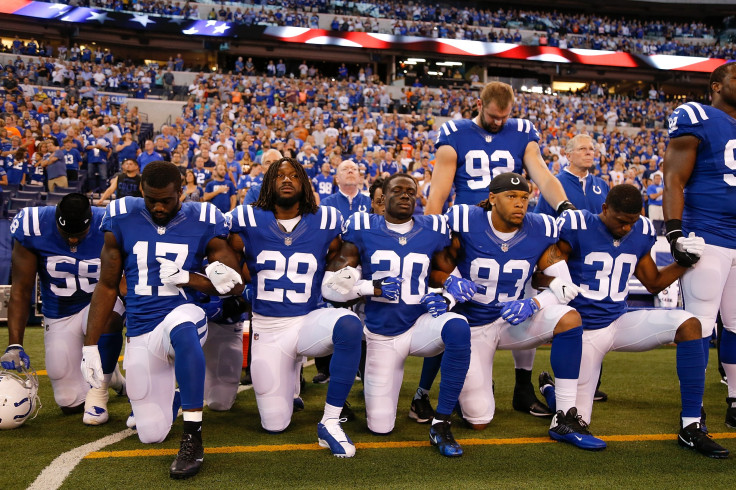NFL Fans Offended By Kneeling Players Could Be Refunded

A proposed piece of legislation in Indiana would require the Indianapolis Colts to offer refunds to fans offended by players kneeling for the national anthem at Lucas Oil Stadium. The bill would also apply to any other professional sporting event being held in the Hoosier state.
Republican Rep. Milo Smith, of Columbus, Indiana, said his bill is intended to give a voice to fans who feel disrespected by players' anti-police brutality protests that are practiced by players across the NFL. The plan would allow Colts fans to receive face-value ticket refunds at games or events where the players knelt during the national anthem. The legislation will be debated by the Indiana legislature during its upcoming session.
"To me when they take a knee during the national anthem, it’s not respecting the national anthem or our country," Smith told the Indianapolis Star. "Our government isn’t perfect, but it's still the best country in the world and I think we need to be respectful of it."
Smith said he was personally offended after he attended a Colts game on Sept. 24 against the Cleveland Browns and players from both teams knelt before the game in protest of nationwide police brutality. President Donald Trump weighed in on the player protests, calling them “divisive” to the country, although the protests attracted more NFL players after the president’s remarks.
Smith’s bill would allow Colts game attendees to receive a refund by the end of the first quarter if players from the home team were seen kneeling in protest. These fans would then have to leave the game.
Smith said he doesn’t want to take away a player’s right to protest, but insisted that fans who are offended by their protests should have the right to a refund. The proposed bill would apply to any professional sporting event in the state of Indiana. However, Smith told WRTV-6 that if the bill passes through committee, he may look to expand this rule to high school and college sports events taking place in the Hoosier state.
© Copyright IBTimes 2025. All rights reserved.





















